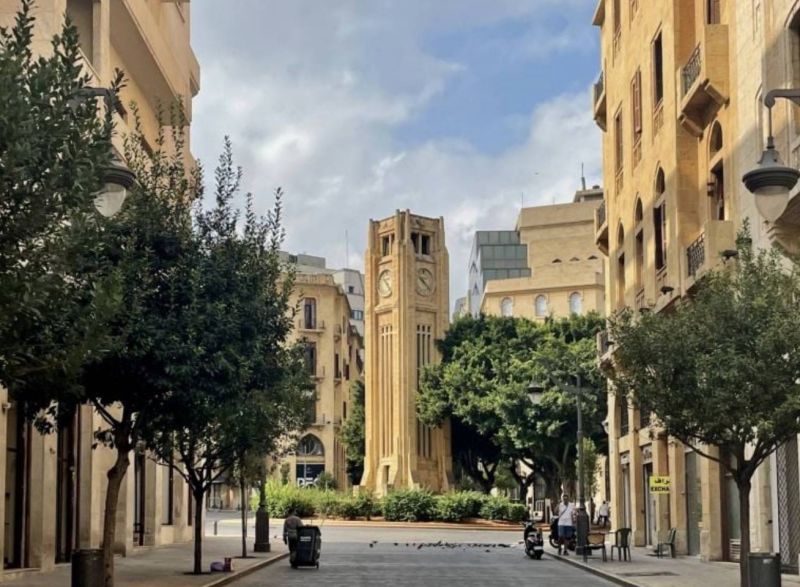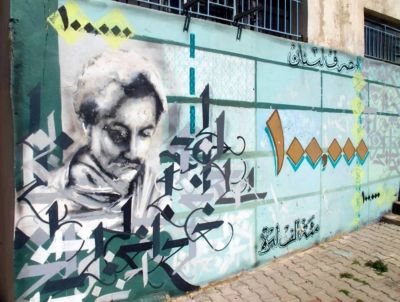
Place de l'Etoile in downtown Beirut, near the Parliament and the Grand Serail. (Credit: PHB)
The four deputy-governors of Banque du Liban (BDL) — namely first deputy governor Wasssim Mansouri, second deputy governor Bachir Yakzan, third deputy governor deputy Salim Chahine and fourth deputy governor Alexandre Moradian — have spent the summer advocating for the appointment of a successor to Governor Riad Salameh, whose fifth term of office in 30 years ends in late July. Appointed in 2020, the deputy governors have threatened to resign.
Many consider Salameh responsible in part for the economic crisis that has ravaged the country since 2019. Salameh has been targeted by a series of legal proceedings in both Lebanon and Europe, making the prospect of him remaining in office after July 31 highly unlikely.
The deputy-governors presented a six month strategy aimed at shifting from the current monetary policy — which tolerates the presence of several exchange rates — to one that allows the lira to float. The four deputy-governors submitted their plan to the parliamentary Administration and Justice Committee on Thursday.
The strategy mainly involves replacing BDL’s Sayrafa exchange rate platform with a mechanism managed by an international operator, over which the central bank will have limited influence. This initiative will be accompanied by a series of reforms, many of which Lebanon has been reluctant to implement since the first months of the crisis.
Press conference on hold
At the end of the meeting Thursday, Mansouri stated that the discussions had faltered and that the deputy governors’ decision would depend on the MPs. It was said that a press briefing would be held Tuesday, but the situation was no longer certain on Sunday afternoon.
“There is no final decision yet. Negotiations are still under way,” Chahine told L’Orient-Le Jour.
Some media reports (includig al-Nashra and LBCI) announced that caretaker Prime Minister Najib Mikati asked the deputy governors to postpone their press briefing, and that they were now waiting for Mikati to speak before deciding how to proceed. A meeting is expected to take place between Mikati and the four deputy governors later this week.
Divided opinions
While some have criticized the deputy governors for acting too late, others believe they did not have the means to act earlier. “In their defense, they have been working for several months on the new foreign exchange platform, for which they have requested technical assistance from the International Monetary Fund,” said a financial source who requested anonymity.
Although the deputy-governors’ strategy failed to immediately win over taxpayers and MPs, it is viewed favorably by caretaker Deputy Prime Minister, Saade Chami. When contacted, Chami said the plan aligns with the cabinet’s recovery plan and recommendations of the IMF, with whom Lebanon signed a staff-level agreement in April 2022.
“This has already been pointed out by others, but I will also say this: Sayrafa’s operation is obscure and it is more of a platform for recording cash transactions whose exchange rate is not defined by supply and demand,” said Chami, a former IMF veteran.
He added that the timetable imposed by the vice-governors was very ambitious, even though the country had still not implemented all the preliminary reforms listed in the IMF staff-level agreement. “But if there is the political will, a lot can be done in six months,” he told L’Orient-Le Jour.
Possible scenarios
Some in the banking sector believe that key measures in the plan should be implemented as soon as possible.
“Everything they are advocating should already have been put in place, especially the adoption of a law introducing formal capital controls or floating the exchange rate. The problem lies in the political paralysis,” said a chairman of a local bank, who declined to be named given the sensitivity of the issue.
Banks have restricted depositors’ access to their foreign currency funds, and some bank owners are pushing for the adoption of formal capital controls to put an end to the wave of lawsuits brought against them in Lebanon and abroad.
The chairman believes that BDL’s deputy governors must acknowledge their responsibilities. “They can't leave their posts just like that, from one day to the next. And even if they do resign, they will have to make decisions.”
According to the bank chairman, if the paralysis persists, the deputy governors could appropriate the prerogative provided under the Code of Money and Credit to temporarily and exceptionally restrict the movement of capital, to protect the national currency and financial system.
“It is highly unlikely that the deputy-governors would agree to face this responsibility alone,” said the financial source, asserting that the absence of parliamentary commitment would constitute grounds for the resignation of the four men.
“However, if the deputy governors resign and decide not to go to work, the current governor will be alone on board and the possibility of the cabinet extending his term of office, at least for a short time, would become almost certain,” the financial source continued.
Speculation and rumors about what would happen after Aug. 1 have multiplied in the press recently, amid a presidential vacancy obstructing the appointment of grade 1 civil servants.
Despite lack of unanimity, the most likely scenarios are as follows: either the 1st deputy governor, who is close to Parliament Speaker Nabih Berri, takes over, or the ruling class manages to agree on a successor with full powers.
The possibility of extending Salameh’s term seems far-fetched and the possibility of seeing BDL’s central council entirely deserted after Aug. 1 is equally unlikely.
Nonetheless, if the first scenario were to take place, the possibility of Salameh taking on an advisory role to the first deputy governor is also being raised by some commentators.
This article was originally published in French in L'Orient-Le Jour. Translation by Joelle EL Khoury.
